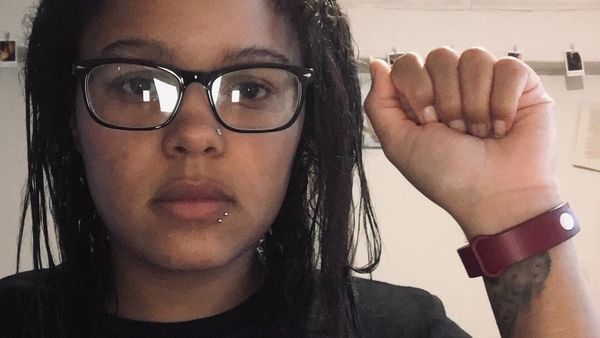Throughout the course of human history, there have always been times where people have begun to analyze their conditions and strive for a better world. In the United States of America one era of change began when one woman, Rosa Parks, refused to give up her bus seat to a white passenger. At the time the American south was segregated and black passengers were required to give up their seats to whites, if asked. Rosa's decision to stay in her seat created a domino effect, in which many other people were inspired to fight for a world where they would be treated as equals. Important advances for social equality were made in black communities, LGBT communities, and towards feminism in the United States. For many years people felt hope and were uplifted in their cause for freedom.
Eventually, years passed and the problems that once inspired change in this country returned to the public eye. On February 26, 2012, in Sanford, Florida George Zimmerman fatally shot Trayvon Martin, a 17 year old African American high school student. Trayvon Martin was unarmed at the time, and Zimmerman claimed to be acting in self defense, and by law the police were prohibited from making an arrest, under Florida's Stand Your Ground statute. This incident opened up the conversation of race in America again, a discussion that many Americans thought was over with. Historically, black communities and the police haven't really gotten along very well. So the story of George Zimmerman, a neighborhood watch coordinator, taking the law into his own hands and executing a young unarmed black boy opened up racial wounds that many Americans were already acquainted with. The election of President Barack Obama, America's first black President, meant the beginning of a new era of prosperity for many Americans. Many believed that the dream of racial harmony had finally been realized. In time, Americans realized that the America they wanted to believe in just didn't exist.
Racial incidents continued to awaken the conscience of the American public. On June 17, 2014, Eric Garner died in Staten Island, New York City, after a New York City Police Department officer put him in a chokehold for about 15 to 19 seconds while arresting him. The chokehold has been prohibited in the NYPD since the 1990s. The New York City Medical Examiner's Office decided Garner died due to the chokehold and the fact that he was already in poor health. Officer Daniel Pantaleo, the man who put Garner in a chokehold, was not indicted. Eric Garner wouldn't be the last unarmed black man to be killed by the police. He certainly wasn't the first. The pattern of unarmed black civilians being executed continued after Garner's death. In Ferguson Missouri, Michael Brown, an 18 year old African American male, was shot by Darren Wilson, a white Ferguson police officer.
Once again, an unarmed black male was executed by a police officer. Protests of the incident echoed in Ferguson, Missouri and in cities all across the United States. Americans grew disgusted by the recent police brutality that ended the lives of many African Americans. It made people realize that racism was still alive and would continue to rear its ugly head wherever discrimination and intolerance thrived. It exposed the flaws of the American judicial system and allowed Americans to analyze the conditions they were under. James A. Baldwin once said: "I love America more than any other country in this world, and, exactly for this reason, I insist on the right to criticize her perpetually. As American citizens it's our duty to question the things that take place in this country. We are responsible for the destiny of this place we call home. Change has taken place within our society many times before and it has propelled men and women to realize the call for human decency in our lives. This force is absolute and exists each moment we decide to put our attention on things that matter.





















